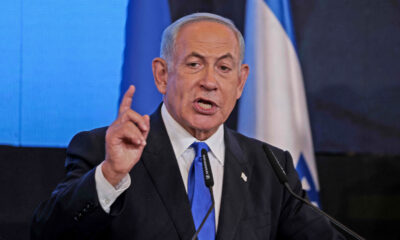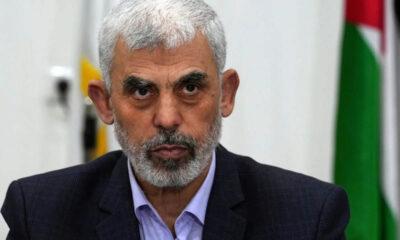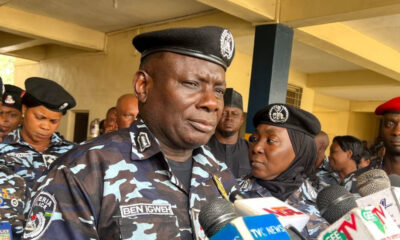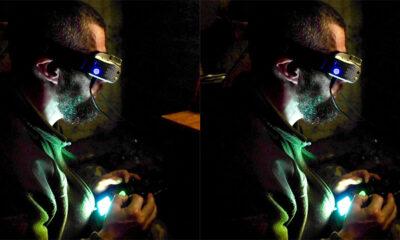International
Zelensky, entering new stage of war, faces political test

Nearly every day, Ukrainian President Volodymyr Zelensky, clad in dark green, records a video address to the Ukrainian people, sometimes seated at a desk, other times standing outside in the dark of the night. Lately, he has been warning of difficulties yet to come.
“We all equally want to win — all of us — but there will be battles ahead,” Zelensky said Thursday, with street lamps illuminating Kyiv’s ornate House of Chimeras, part of the government complex, behind him. “We still have a difficult path to travel to get everything we are striving for.”
Among the most challenging paths is that facing Zelensky himself.
The 44-year-old Ukrainian comedian has evolved from a political neophyte, widely doubted among Western leaders and Ukrainian voters in the run-up to the war, into a crisis commander who has cemented his place in the history of Ukrainian nationhood and inspired a will to resist at home and abroad with personal bravery.
Now, as the war grinds on in its sixth week and peace talks between Ukrainian and Russian negotiators continue, Zelensky faces a new set of challenges. He must keep up morale and the will to fight amid battlefield casualties, economic devastation and vast civilian suffering. He must retain the confidence of Western nations that Ukraine can prevail to ensure weapons keep flowing.
But as time goes on he must also figure out what if any sort of political agreement with Moscow to end the war will be acceptable to a Ukrainian population riding high after repelling Russian forces in many areas and feeling inspired to resist by his own actions and words.
“He has relied on intense feelings of nationalism to continue to fight this war, but those are exactly the forces that make it extremely difficult to put this war to an end,” American University political science professor Keith Darden said, noting that it’s unclear how long Ukraine can keep up the fight. “That’s the real dilemma in my mind.”
READ ALSO:
- Anti-govt sermon: Suspended Abuja Imam breaks silence, says ‘only God dethrones’
- Abductors Of Abuja Monarch Ask Family Members To Sell His House To Raise N20m Ransom
- Russia Hits Ukraine’s Strategic Port Of Odessa
- Iheanacho scores in Leicester’s draw with Man United
Zelensky for months has unsuccessfully been seeking a meeting with Russian President Vladimir Putin to discuss Moscow’s myriad demands. David Arakhamia, head of the Ukrainian delegation to the talks, said Saturday that Kyiv is preparing for a possible meeting between Zelensky and Putin in Turkey.
For Zelensky, however, any deal with the Kremlin is politically fraught.
One effect may be to prolong the war if Zelensky doesn’t feel he has the public backing to make the compromises necessary to stop it. Another might be that his extraordinary public support erodes in service of a peace agreement.
Zelensky has been laying the groundwork with Ukrainians to end the country’s constitutionally enshrined quest to enter NATO, noting that the alliance isn’t prepared to accept Kyiv. He has focused efforts instead on securing European Union membership.
The Ukrainian leader has shown flexibility and practicality, defining victory in an interview with the Economist last month as “being able to save as many lives as possible.”
“Our land is important, yes, but ultimately it’s just territory,” he said.
At the same time, however, he pledged to fight Russia “to the last city.”
Zelensky also has warned Ukrainians that the Russians are likely regrouping to focus on attacking a more targeted set of areas, particularly those where Ukrainian forces may face the most difficulty — and has called on Ukrainians to steel themselves for a long conflict.
“Right now everyone is eager to resist — eager if not to win, then to batter Russia as much as possible,” said Mikhail Minakov, a political analyst on Ukraine at the Kennan Institute. “He is in a sort of Catch-22. He tries to find the possible way of staying in this position, remaining charismatic, but at the same time to find a solution.”
Underestimated in Moscow and the West
After playing Ukraine’s president in a popular TV series, Zelensky entered office in 2019 with extraordinary popular support, commanding 73 percent of the vote, as well as a majority for his party in the Ukrainian parliament. He attracted a broad and disparate swath of voters with his populist outsider appeal and promise to end the war in Ukraine’s east.
But by late last year, as Russia amassed troops and materiel on Ukraine’s border, Zelensky’s approval rating had plummeted to about 30 percent. Met with Russian intransigence and Ukrainian political constraints, he failed to end the war. His inexperienced team realized the difficulty of implementing big changes.
Russia’s invasion appeared to indicate the Kremlin also thought little of Zelensky, expecting the former actor to flee Kyiv out of fear for his own life in a manner that would hobble the country’s ability to resist.
Zelensky was equally underestimated among Ukraine’s partner nations in the West, where many officials viewed him as an inexperienced and somewhat unpredictable leader who failed to appreciate the seriousness of the security situation. In the days before the war, Zelensky’s advisers expressed doubts Russia would invade. One senior adviser, reflecting the atmosphere around Zelensky, insisted the Russians were “bluffing” and looking only to intimidate Ukraine.
READ ALSO:
- Suspected cultist kills dad over sleep disturbance in Ogun
- How people fall victim to fake Customs car auction by internet fraudsters
- N30,000 permit for borehole drilling in Oyo unacceptable — Association
Russian forces had massed on the border before and backed down. The aide said he saw no reason to believe that this time would be different — and blamed the Biden administration for stoking panic with talk of an invasion. He said that Zelensky’s main responsibility was to avoid a run on banks and capital flight from the country.
But career officials within Ukraine’s national security apparatus agreed with U.S. and British intelligence assessments that Russia was likely to invade. They were frustrated in their own efforts to persuade Zelensky and felt his closest advisers weren’t telling him the hard truth that an invasion looked imminent, said one senior Ukrainian official.
In mid-January, CIA Director William J. Burns flew to Ukraine and met with Zelensky. According to people familiar with their conversation, Burns shared intelligence that had persuaded U.S. officials about Russia’s intentions. At the time, intelligence also suggested that Russian hit teams might already be in Kyiv, according to officials familiar with the information who, like others, spoke on the condition of anonymity to discuss sensitive diplomacy and intelligence.
Zelensky asked if he and his family were personally in danger. The CIA director made clear that the president needed to take his security seriously. Zelensky was skeptical, the Ukrainian officials said. The Zelensky senior adviser said that the information Burns shared sounded dire but, in his opinion, wasn’t specific enough for the Ukrainians to act. U.S. officials have disputed that characterization, noting that by the time Zelensky and Burns met, the Biden administration had already declassified intelligence including satellite photos that showed Russian forces moving into attack formations.
Zelensky didn’t call on his citizens to evacuate or authorize a general mobilization. Cafes and shops in the capital remained open until the very last moment. A former Western intelligence official in Kyiv at the time said he was bewildered that the government wasn’t conducting frequent tests of air raid warning sirens and public drills.
For much of January, as the United States and other NATO allies delivered one warning after another to the Ukrainians of the buildup on their border, Kyiv’s political world was focused on treason accusations against Zelensky’s predecessor, former president Petro Poroshenko.
A hero emerges
After the Russians invaded and tried to make a lightning dash into Kyiv, Zelensky demonstrated far more mettle than politicians in both Russia and the West had expected, refusing to leave the capital even as those intent on killing him tried to enter the city.
“I was positively surprised,” Minakov said. “I myself see the emotion of this charisma. I respect him for what he is doing — and that is an unusual feeling. In Ukraine, we don’t usually respect politicians.”
Even after Zelensky’s display of courage, many around the world still expected him to be killed by Russian invaders in Kyiv or forced to flee the capital within days. But the Ukrainian military performed far better than many expected. The Russians, meanwhile, bungled their assumptions and logistics, stalling the advance on the capital.
With the prospect of finally meeting Putin in person for peace talks, Zelensky is armed with a groundswell of political support, as well as battlefield successes. He faces a test of whether he can parlay that political capital into a lasting peace acceptable among most Ukrainians.
It’s unclear if the moment is right, as Russian forces still appear determined to take more territory in the east, and Ukraine so far remains unwilling to give up any of the land Russia has claimed since Feb. 24.
Serhiy Leshchenko, a former member of Ukraine’s parliament now advising Zelensky’s chief of staff, said despite the desire to continue resisting, there are perhaps less-vocal Ukrainians under siege who want and need an agreement to stop the fighting.
“People living under bombing in Mariupol, Kharkiv and Chernihiv have much less access to social media than people in a safe place,” Leshchenko said, before noting the dilemma facing Zelensky.
“People want to stop the war. People want normal life to come back,” Leshchenko said. “People want to defend Ukraine from the aggressor. People don’t want to lose territory and sovereignty.
THE WASHINGTON POST
International
Thousands pay tributes as Pope Francis’ body lies in state at St. Peter’s Basilica

Thousands pay tributes as Pope Francis’ body lies in state at St. Peter’s Basilica
Vatican City was filled with the sounds of bells and heartfelt chants on Wednesday morning, as thousands of mourners gathered to honor the late Pope Francis.
In a moving and solemn procession, his simple wooden coffin was carried through St. Peter’s Square, marking the beginning of final rites for the beloved pontiff.
The procession began at the Domus Sancta Marta, the residence where Pope Francis passed away, and continued toward St. Peter’s Basilica. There, his body will lie in state until his funeral, scheduled for Saturday.
Two long lines of cardinals and Vatican officials escorted the coffin, while faithful from around the world looked on in prayer and reverence.
Dressed in a red chasuble and a white miter, with a rosary gently wrapped around his fingers, Pope Francis was honored with continuous applause as Swiss Guards solemnly accompanied the casket through the square.
Teresa Piuvano, a New Jersey resident who has been in Rome since March volunteering at Vatican events for the Jubilee year, saw Francis’ appearances on Palm Sunday and Easter Sunday. Easter, she said, “was the most special. I think he wanted to do that to say goodbye to the people because he rode around the whole square even though he was very ill.”
Inside the basilica, the pope was laid on a simple podium instead of the wooden structure, called a catafalque that has traditionally held a pope’s coffin as he lies in state. The ceremony that concluded the procession, led by Cardinal Kevin Farrell, who as camerlengo is charged with overseeing the logistics of the pope’s funeral, referred to Francis in humble terms such as “bishop” and “pastor.”
READ ALSO:
- Rivers: Tinubu set to emergency rule after meeting Fubara
- NNPCL: Protesters storm AGF office, demand probe of Mele Kyari
- Fresh herders’ attack claims 11 lives in Benue
“Dearest brothers and sisters, with great emotion we accompany the mortal remains of our Pope Francis into the Vatican basilica where he often exercised his ministry as the bishop of the church that is in Rome and as pastor of the universal church,” Farrell said in the prayer service.
After the death of Pope Emeritus Benedict XVI, Francis changed the protocol for papal funerals to streamline and simplify the procedures. The pope wanted his own funeral to reflect the life of a pastor and not of a powerful king or politician, he said in interviews.
After the ceremony, cardinals proceeded to bow one by one in front of the coffin before the mourners lined up in the square were admitted.
Nearly 20,000 people visited the basilica yesterday, according to the Vatican, which added that it would ensure that all who wish to pay their final respects to the pope have a chance by staying open after midnight if necessary.
Second General Congregation of Cardinals held in the Vatican
The second General Congregation of Cardinals began yesterday afternoon in the Synod Hall at about 5:00 PM, and ended at 6:30 PM.
According to the Holy See Press Office, 103 cardinals were present. They began the meeting with the ‘Veni, Sancte Spiritus’ prayer, and then with a prayer in suffrage of Pope Francis.
The Cardinals who were not present at Tuesday’s General Congregation were sworn in.
The programme of the Novemdiales, the ancient nine-day period of mourning for the Pope, was approved.
The next General Congregation will be today at 9:00 AM.
At the first General Congregation, held on Tuesday morning, the Cardinals decided to suspend all scheduled beatifications until the new Pope can approve them.
Moreover, in accordance with the norms of Universi Dominici Gregis, a commission of three Cardinals was selected by lot to assist the Camerlengo in the governance of the Church during the sede vacante.
These three Cardinals represent the three orders of the College of Cardinals and are replaced every three days. The first group of three Cardinals chosen was Pietro Parolin (episcopal order), Stanisław Ryłko (presbyteral order), and Fabio Baggio (diaconal order).
The Holy See Press Office noted that around 20,000 people had paid their respects to the late Pope Francis as of 7:30 PM on Wednesday evening.
Why King Charles isn’t allowed at pope’s funeral
Prince William will be traveling to the Vatican to attend the funeral of Pope Francis on behalf of the British royal family later this week. And if you’re wondering why King Charles isn’t going, he literally isn’t allowed.
Royal expert Katie Nicholl writes in Vanity Fair that King Charles “will not travel to the Vatican, in accordance with protocol and precedence which dictates that the Sovereign does not attend funerals, Buckingham Palace has confirmed.” And FYI, this isn’t the first time an heir has attended the funeral of a pope on behalf of the sovereign—back in 2005, then-Prince Charles attended Pope John Paul II’s funeral instead of Queen Elizabeth.
That said, King Charles did visit the pope just a few days before his recent passing, and he released a statement after his death.
Thousands pay tributes as Pope Francis’ body lies in state at St. Peter’s Basilica
International
UK records over 22,000 asylum-seeking Nigerians

UK records over 22,000 asylum-seeking Nigerians
The United Kingdom Home Office received 22,619 asylum petitions from Nigerian nationals between 2010 and 2024.
Nigerians accounted for one in every 30 UK asylum claims over the time, ranking 11th in the Home Office’s recently released year-end asylum and resettlement figures.
According to the Home Office, over two times as many Nigerians (2,841) requested asylum in 2024 than in 2023 (1,462).
Overall, 108,138 people applied for asylum in the UK in 2024, representing a 378 per cent increase from 2010. The majority were first-time claims by South Asian and Middle Eastern nationals.
Iran topped the chart with 75,737, perhaps pushed by the rising persecution of dissidents by the Iranian regime.
Pakistan trailed far behind with 57,621. In 2024, 10,542 Pakistanis sought asylum in the UK, prompted by post-election upheaval, rising inflation, and an increase in blasphemy cases, which human rights groups argue provide strong grounds for protection claims.
Afghanistan has received 54,363 asylum petitions since 2010. In 2024, 8,508 Afghans sought sanctuary in the United Kingdom, a development that experts suggest is a continuation of the Taliban’s ouster of the Karzai administration in 2022.
That year, 11,358 Afghans applied for asylum in the United Kingdom, with 9,710 applications the following year.
Others include Albania (50,944), Iraq (45,711), Eritrea (37,687), Syria (34,997), and Bangladesh (31,744). Asylum seekers from Bangladesh increased from 5,097 in 2023 to 7,225 in 2024. The rise corresponded with the removal of previous Prime Minister Sheikh Hasina.
READ ALSO:
- Driver crushes one-year old boy to death in Ekiti
- Bring your children to compete with mine, MC Oluomo challenges those mocking his spoken English
- Insecurity: Presidency questions push for state police, accuses govs of not doing much
Sudan and India complete the top ten, with 30,897 and 30,179, respectively.
Nigeria’s 22,619 filings are just ahead of Sri Lanka’s 22,059 and surpass Vietnam, China, and Turkey. Brazil, Kuwait, Yemen, Colombia, and Jordan were at the bottom of the list, with each providing fewer than 6,500 claims.
Analysts attribute Nigeria’s rise on the list to tough conditions such as insecurity, bandit assaults, abduction, and a collapse in household purchasing power following the naira’s devaluation in 2023.
In a conversation with our correspondent, Charles Onunaiju, Research Director, Centre for China Studies, Abuja, stated, “We face a difficulty. Nigeria is becoming unfriendly, particularly for young people with limited opportunities, and there is a desperate desire to travel overseas.
According to local reports, young professionals who previously entered the UK on skilled worker visas are increasingly hedging their bets by applying for asylum once there; others arrive irregularly via continental Europe, citing kidnapping threats and communal attacks in their affidavits.
According to the reports, in most cases, petitioners also claim political persecution under Nigeria’s wide cybercrime legislation or discrimination based on sexual orientation—both of which are protected under the Refugee Convention.
According to the Home Office’s website, an asylum seeker must demonstrate a “well-founded fear of persecution” because of their race, religion, nationality, political opinion, or membership in a certain social group.
The Home Office determines the initial decisions, and negative rulings can be challenged in the Immigration and Asylum Chamber.
In theory, the Illegal Migration Act of 2023 makes people who travel through a safe third nation inadmissible.
However, the UK government’s proposed removal process, particularly its contract with former Prime Minister Rishi Sunak to transfer claimants to Rwanda, is still enmeshed in legal obstacles.
As a result, the majority of 2024 and 2025 arrivals will continue to use the existing system.
Dr Aliyu Ilias, an Abuja-based development economist, told The PUNCH that as more Nigerians leave and stay permanently overseas, the country will have less trained labour.
He stated that with most Nigerians confronting both economic headwinds and deteriorating security at home, the British asylum route, however uncertain, still appears to offer a better prospect.
Ilias explained, “It’s definitely a cause of concern because this includes our professionals who are moving, and it takes a whole lot to train these professionals.
“In the medical sector, Nigeria subsidises a lot to get people trained. You cannot get trained as a medical doctor or an engineer abroad for a cheaper cost compared to what we get in Nigeria.
“So, it is total brain drain in the long run, and for the economy, it is reducing our GDP. The appalling part is that most of our Nigerian brothers and sisters who go out do not return. They get permanent residency, and they become valuable to the immediate country.”
UK records over 22,000 asylum-seeking Nigerians
International
Harvard University sues Trump over funding cuts

Harvard University sues Trump over funding cuts
Harvard sued US President Donald Trump’s administration Monday in a sharp escalation of the fight between the prestigious university and the Republican, who has threatened its funding and sought to impose outside political supervision.
Trump has sought to bring several prestigious universities to heel over claims they tolerated campus anti-Semitism, threatening their budgets, tax-exempt status and the enrolment of foreign students, but Harvard has refused to bow.
“This case involves the Government’s efforts to use the withholding of federal funding as leverage to gain control of academic decision making at Harvard,” the Ivy League university said in a lawsuit filed in a Massachusetts federal court that named several other institutions targeted by Trump.
“The Government’s actions flout not just the First Amendment, but also federal laws and regulations,” said the complaint, which called Trump’s actions “arbitrary and capricious.”
Trump is furious at Harvard for rejecting government supervision of its admissions, hiring practices and political slant and last week ordered the freezing of $2.2 billion in federal funding to the storied institution.
The lawsuit calls for the freezing of funds and conditions imposed on federal grants to be declared unlawful, as well as for the Trump administration to pay Harvard’s costs.
Trump and his White House team have publicly justified their campaign against universities as a reaction to what they say is uncontrolled “anti-Semitism” and a need to reverse diversity programs aimed at addressing historical oppression of minorities.
READ ALSO:
- NNPCL: Ojulari’s ambitious five-year $60bn investment agenda
- Osimhen to rake in N136bn from Man United
- U20 AFCON: Flying Eagles tackle Young Pharaohs in friendly
The administration claims protests against Israel’s war in Gaza that swept across US college campuses last year were rife with anti-Semitism.
Many US universities, including Harvard, cracked down on the protests over the allegations at the time, with the Cambridge-based institution placing 23 students on probation and denying degrees to 12 others, according to protest organizers.
“Harvard can no longer be considered even a decent place of learning, and should not be considered on any list of the World’s Great Universities or Colleges,” Trump said on his Truth Social platform last week.
“Harvard is a JOKE, teaches Hate and Stupidity, and should no longer receive Federal Funds.”
-

 metro2 days ago
metro2 days agoRivers: Tinubu meets with Fubara, may lift his suspension
-
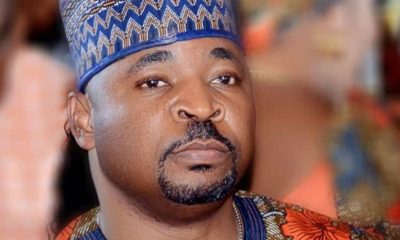
 metro2 days ago
metro2 days agoBring your children to compete with mine, MC Oluomo challenges those mocking his spoken English
-

 metro2 days ago
metro2 days agoI’m not in supremacy battle with Ooni, says new Alaafin
-

 News3 days ago
News3 days agoTinubu returns to Nigeria after France, UK trip
-

 Business2 days ago
Business2 days agoMarketers count losses as NNPC slashes petrol price
-

 metro3 days ago
metro3 days agoRivers: Fubara’s supporters praise Tinubu’s intervention with emergency rule
-
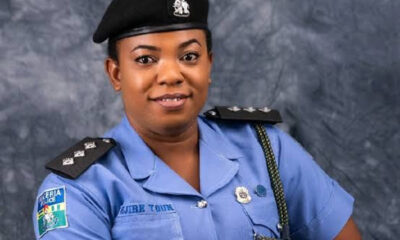
 metro2 days ago
metro2 days agoBandits attack Kwara North, kill vigilante, six others
-
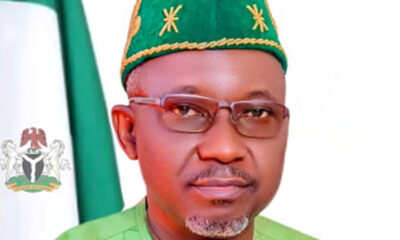
 Business1 day ago
Business1 day agoNigeria’s gas production increases by 15.6% to 227,931.65 mscf



